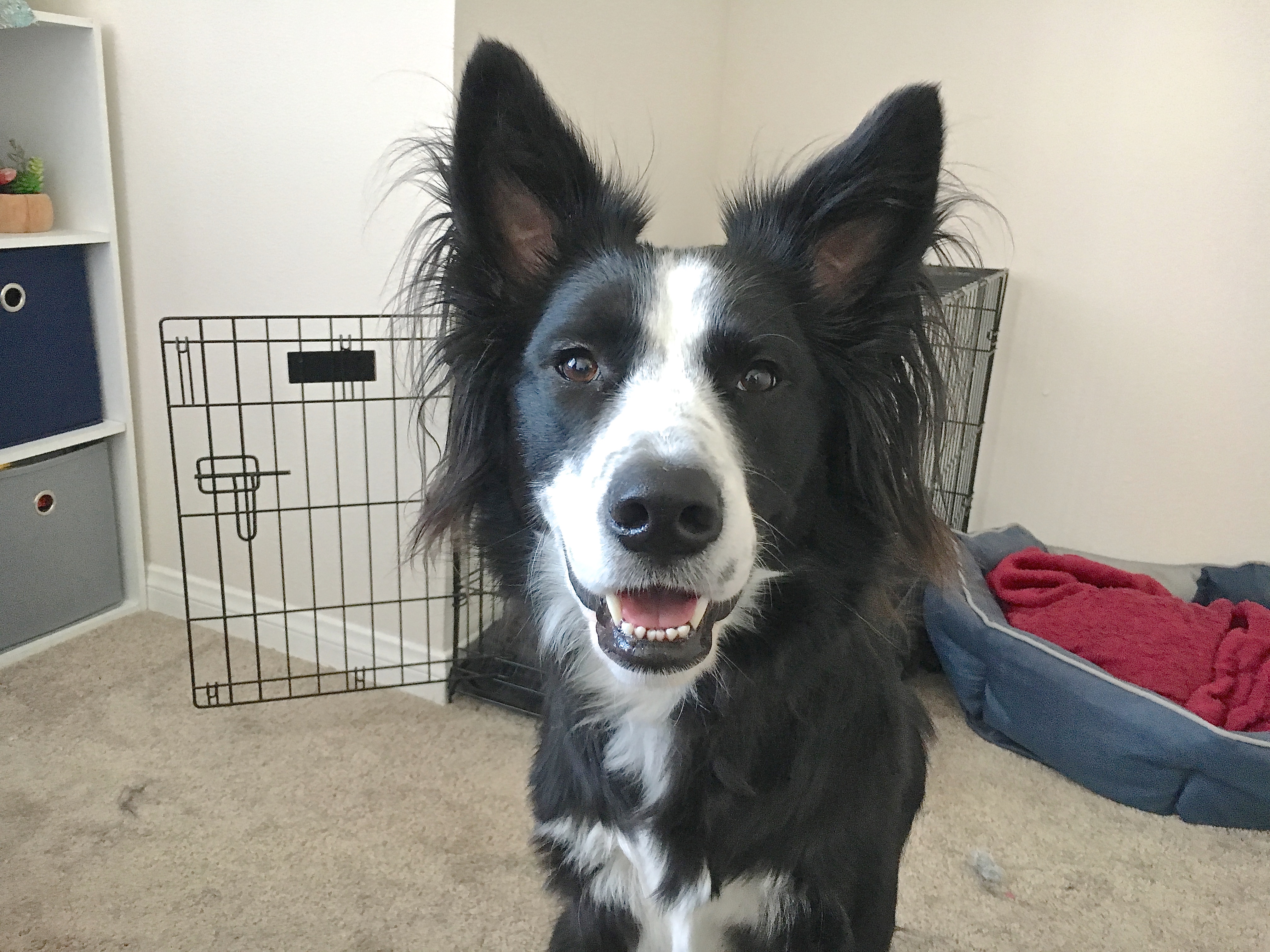Border Collie puppies are known for their intelligence and energy. But, their barking can become a challenge for many pet owners.
Are you struggling to keep your Border Collie puppy from barking too much? You are not alone. Many pet owners face this issue. The good news is there are effective ways to address this. Border Collies are naturally vocal, often barking out of excitement, boredom, or to alert you.
Understanding why your puppy barks is the first step. This helps in finding the right approach to reduce it. In this blog, we will explore practical tips to help you manage your puppy’s barking. This will lead to a quieter, happier home for both you and your furry friend. Stay tuned to learn more!

Credit: www.youtube.com
Causes Of Barking
Barking is a natural behavior for Border Collie puppies. Understanding the reasons behind it can help you address this issue effectively. Identifying the root causes is essential to finding the right solution. Here are some common causes of barking in Border Collie puppies.
Boredom
Border Collies are intelligent and active. They need regular physical and mental stimulation. Without it, they get bored and start barking. Engage them with toys, games, and exercises. This can reduce their boredom and, in turn, their barking.
Fear And Anxiety
Puppies often bark out of fear or anxiety. Loud noises, new environments, or strangers can trigger this response. Comfort your puppy in these situations. Gradually expose them to new experiences. This can help reduce their anxiety and barking.

Credit: www.doggoneproblems.com
Understanding Your Puppy
Understanding your Border Collie puppy is key to managing their barking. Knowing their body language and vocal cues helps you address their needs. This makes training them easier and more effective.
Body Language
Border Collies use body language to communicate. Recognizing these signs helps you understand their feelings and needs.
Common body language signs include:
- Tail position: A high tail means excitement or alertness. A low tail can mean fear or submission.
- Ears: Erect ears show interest. Flattened ears often indicate fear or aggression.
- Eyes: Wide eyes suggest excitement or fear. Soft eyes indicate relaxation.
- Body posture: A stiff body shows tension. A relaxed body means your puppy feels safe.
Observing these signs helps you respond appropriately to your puppy’s needs.
Vocal Cues
Barking is a key vocal cue for Border Collie puppies. Different barks have different meanings.
Common vocal cues include:
| Bark Type | Meaning |
|---|---|
| Short, repetitive barks | Excitement or playfulness |
| Continuous barking | Alertness or anxiety |
| Whining or whimpering | Fear or discomfort |
| Growling | Warning or aggression |
Listening to these vocal cues helps you understand your puppy’s emotions. Respond to their needs to reduce unnecessary barking.
Consistent observation and response to your puppy’s body language and vocal cues is crucial. This builds trust and reduces unwanted barking.
Training Basics
Teach your Border Collie puppy to stop barking by using consistent commands and positive reinforcement. Consistency and patience are key in training.
Training your Border Collie puppy to stop barking can be challenging. Yet, with the right techniques, it becomes manageable. Start with understanding the basics of training. This foundation helps in achieving desired results.Positive Reinforcement
Use positive reinforcement to encourage good behavior in your puppy. Reward them with treats or praise when they are quiet. This helps them associate silence with rewards. Keep treats handy during training sessions. Consistency in rewards strengthens this behavior.Consistency
Consistency is key in training. Use the same command for quiet every time. Ensure everyone in the household follows the same rules. This avoids confusing your puppy. Regularly practice training sessions. Short, frequent sessions work best. This way, your puppy learns faster and retains the lessons. “`Reducing Barking Triggers
Minimize barking triggers to help your Border Collie puppy stay calm. Identify and reduce noises, strangers, or other animals. Consistent training will create a peaceful environment.
Reducing barking triggers is essential for a peaceful home. Border Collie puppies are intelligent and active, often barking due to various triggers. By addressing these triggers, you can reduce unnecessary barking. Two effective methods are socialization and desensitization.Socialization
Socialization helps your puppy feel more comfortable. Expose your puppy to different people, animals, and environments. This reduces anxiety and fear, which often cause barking. Introduce new experiences gradually. Reward calm behavior with treats and praise. Regular playdates with other dogs can also help.Desensitization
Desensitization involves exposing your puppy to triggers in a controlled way. Start with low-intensity triggers. Gradually increase the intensity as your puppy becomes comfortable. For instance, if your puppy barks at the vacuum cleaner, turn it on in another room. Slowly bring it closer over time. Pair the presence of the trigger with positive experiences. Treats and affection work well. This teaches your puppy that the trigger is not a threat. By focusing on these techniques, you can reduce your Border Collie’s barking. Your home will be quieter and more harmonious.Mental Stimulation
Mental stimulation is crucial for keeping Border Collie puppies happy and well-behaved. This breed is known for its intelligence and high energy. Without enough mental challenges, they might start barking out of boredom. Keeping their minds engaged can help reduce this unwanted behavior.
Interactive Toys
Interactive toys are a great way to keep your Border Collie puppy busy. These toys often require your puppy to think and solve problems. For example, toys that dispense treats when manipulated can keep them entertained for hours. They provide both mental and physical exercise, reducing the chances of excessive barking.
Rotating different types of interactive toys can keep your puppy interested. Some popular options include treat-dispensing balls and tugging ropes. These toys cater to their natural instincts and keep their brains active.
Puzzle Games
Puzzle games are excellent for challenging your Border Collie puppy’s mind. These games require them to figure out how to get a reward. Simple puzzles can start with hiding treats under cups for them to find. More advanced puzzles involve sliding or lifting parts to reveal treats.
You can easily find puzzles designed specifically for dogs. These puzzles offer various difficulty levels, ensuring your puppy stays engaged. Regularly playing puzzle games helps curb their barking by keeping them mentally occupied.

Credit: www.lovelybordercollie.com
Physical Exercise
Physical exercise is crucial for keeping your Border Collie puppy happy and calm. These active dogs need regular exercise to prevent excessive barking and other unwanted behaviors. Engaging your puppy in various physical activities ensures they stay mentally and physically stimulated.
Daily Walks
Daily walks are essential for your Border Collie puppy. A simple stroll around the neighborhood can work wonders for your puppy’s energy levels. Aim for at least 30 minutes of walking each day. You can break this into two 15-minute sessions if needed. Ensure your puppy gets to sniff and explore different areas, which provides mental stimulation.
| Walk Duration | Frequency |
|---|---|
| 30 minutes | Once daily |
| 15 minutes | Twice daily |
Playtime Activities
Playtime activities are equally important for your Border Collie puppy. Engaging them in fun games can help burn off excess energy. Consider these activities:
- Fetch: This classic game is perfect for high-energy breeds.
- Tug-of-War: Great for building strength and bonding.
- Hide and Seek: Stimulates their natural instincts.
Interactive toys can also keep your puppy entertained. Toys that dispense treats or make noises can be very engaging. Rotating toys can keep things fresh and exciting for your puppy.
- Fetch
- Tug-of-War
- Hide and Seek
Physical exercise is not just about burning energy. It also provides mental stimulation, which is crucial for a happy, well-behaved puppy. By incorporating daily walks and engaging playtime activities, you can help reduce your Border Collie puppy’s excessive barking.
Creating A Calm Environment
Creating a calm environment is essential to stop your Border Collie puppy from barking excessively. A peaceful setting can help soothe your puppy and reduce its anxiety. This will lead to less barking and a happier home for everyone. Here are some effective ways to create a calm environment for your puppy.
Safe Space
Providing a safe space for your Border Collie puppy is crucial. A designated area where your puppy can retreat and feel secure can greatly reduce stress and barking. This space should be quiet and away from the hustle and bustle of daily activities.
Consider using a crate or a small room with familiar items, such as a blanket or favorite toy. Ensure the area is comfortable and free from loud noises. This helps your puppy to relax and feel safe.
Calming Music
Playing calming music can significantly reduce your puppy’s anxiety and barking. Soft, soothing tunes can create a relaxing atmosphere and distract your puppy from triggers that may cause barking.
Many pet owners find that classical music works well. There are even playlists specifically designed for calming dogs. Experiment with different types of music to see what your puppy responds to best.
| Type of Music | Effectiveness |
|---|---|
| Classical | Highly effective |
| Nature Sounds | Moderately effective |
| White Noise | Varies |
Be consistent with your efforts to create a calm environment. This helps your Border Collie puppy feel more secure and reduces barking over time.
Seeking Professional Help
Sometimes, stopping a Border Collie puppy from barking can be challenging. In such cases, seeking professional help is a wise decision. Professionals have the expertise and experience to address the issue effectively. Their guidance can make a significant difference in your puppy’s behavior.
Dog Trainers
Dog trainers are well-versed in dealing with barking issues. They use positive reinforcement techniques to modify your puppy’s behavior. Trainers can identify the root cause of the barking. They work with you and your puppy to develop a tailored plan. This plan addresses specific triggers and behaviors. Consistent training sessions help in seeing long-term improvement.
Veterinarians
Veterinarians play a crucial role in addressing barking issues. They can rule out any medical conditions causing the excessive barking. Sometimes, pain or discomfort may lead to barking. A vet can provide necessary treatment if a health issue is detected. They can also recommend behavioral specialists if needed.
Frequently Asked Questions
Why Do Border Collie Puppies Bark A Lot?
Border Collie puppies bark due to high energy levels, excitement, or boredom. They’re natural herders, so barking is instinctive.
How To Stop Border Collie Puppy Barking?
Use consistent training, positive reinforcement, and mental stimulation. Regular exercise helps reduce excess energy and barking.
What Triggers Border Collie Puppy Barking?
Triggers include strangers, other animals, unfamiliar sounds, or being left alone. Identifying triggers helps in managing barking.
Is Excessive Barking Normal In Puppies?
Yes, it’s common in puppies, especially energetic breeds like Border Collies. Proper training can reduce excessive barking.
Conclusion
Training your Border Collie puppy to stop barking takes time and patience. Consistency is key. Use positive reinforcement methods. Reward good behavior often. Avoid yelling or punishment. This can worsen the problem. Create a calm environment for your puppy. Understand their needs and triggers.
Practice makes perfect. Stay patient and persistent. Soon, your puppy will learn to bark less. Enjoy a quieter, happier home.
